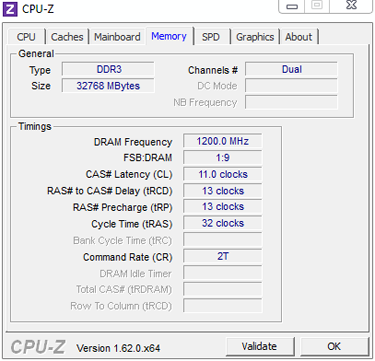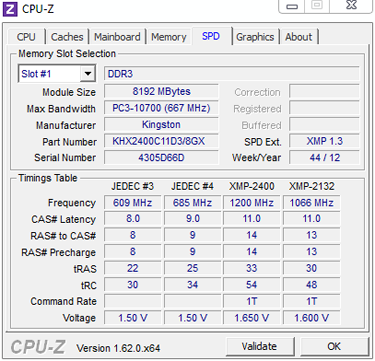Testing Methodology
Comparison Memory |
||||||
|---|---|---|---|---|---|---|
Kingston Beast 2400 |
Kingston Predator HyperX 1866 |
G.Skill RipjawsX 2133 |
||||
| Model | KHX24C11T3K4/32X |
KHX18C9T2K2/16X |
F3-17000CL11D-8GBXL |
|||
| Capacity | 32GB (4x8GB) |
16GB (2x8GB) |
8GB (2x4GB) |
|||
| Speed | 2,400MHz |
1,866MHz |
2,133MHz |
|||
| Timings | 11-13-13-32-2T |
9-10-9-27-2T |
11-11-11-30-2T |
|||
| Voltage | 1.65V |
1.50V |
1.50V |
|||
| Price* | £240 |
£95 |
£47 |
|||
| Cost per GB* | £7.50 |
£5.93 |
£5.88 |
|||
| *Approximate, correct at time of writing | ||||||
Test bench |
|||||||||
|---|---|---|---|---|---|---|---|---|---|
| CPU | Intel Core i7-3770K | ||||||||
| Motherboard | MSI Z77A-G45 Thunderbolt | ||||||||
| Storage device | Samsung 830 Series 256GB SSD | ||||||||
| Graphics card | GeForce GTX 680 (v306.97) | ||||||||
| Power supply | Corsair AX750 | ||||||||
| Operating system | Windows 7 Ultimate SP1, 64-bit | ||||||||
Benchmarks |
|---|
| HEXUS.PiFast (download) |
| CINEBENCH R11.5 (homepage) |
| PCMark 7 v1.04 (homepage) |
| 3DMark 11 v1.0.3.0 (homepage) |
| Call of Duty: BO2 (homepage) |
| Custom Photoshop CS6E 64-bit (homepage) |
Notes
We'd usually benchmark memory on an AMD platform where the onboard graphics can make genuine use of faster bandwidth that's usually present on the best modules. However, after a slew of choice expletives and one-too-many restarts later, our two AMD FM2 motherboards wouldn't stably run at 2,400MHz with all four DIMM slots occupied.
Switching over to an Intel Z77 platform, we used the recently reviewed MSI Z77A-G45 Thunderbolt as a base and installed (and ran) the four-module pack without difficulty. Benchmarking comparisons were provided by a 16GB (2x8GB) pack of low-latency Kingston DDR3-1,866 Predator memory and an 8GB (2x4GB) pack of G.Skill RAM running at DDR3-2,133. All three kits were tested on the same day. The one benchmark to look out for is the Photoshop CS6 Extended test.
Overclocking
Not a lot to report here, folks. We couldn't push the speed much past 2,450MHz when using the shipping timings. Relaxing them further didn't help to increase overall speed, and, try as we might, running at the next speed up, 2,667MHz, was impossible, even with 1.70V. On the flipside, tuning the timings down to an industry-standard 9-9-9-24-2T enabled us to run at around 1,750MHz.











